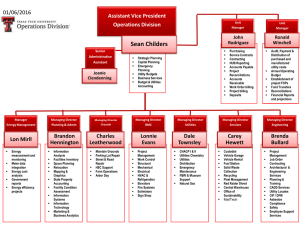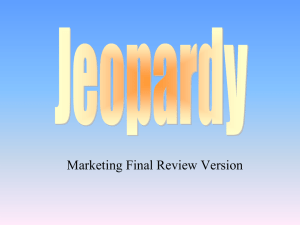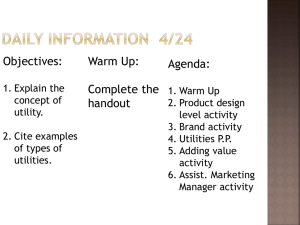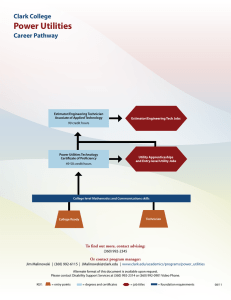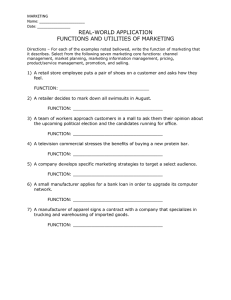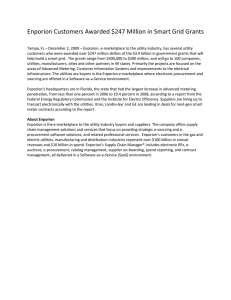– Learner challenge Counting the cost Utilities failure
advertisement
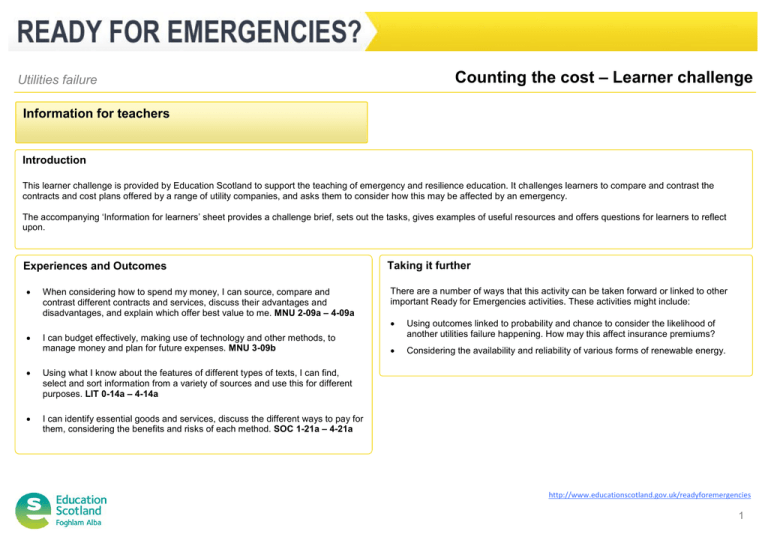
Counting the cost – Learner challenge Utilities failure Information for teachers Introduction This learner challenge is provided by Education Scotland to support the teaching of emergency and resilience education. It challenges learners to compare and contrast the contracts and cost plans offered by a range of utility companies, and asks them to consider how this may be affected by an emergency. The accompanying ‘Information for learners’ sheet provides a challenge brief, sets out the tasks, gives examples of useful resources and offers questions for learners to reflect upon. Experiences and Outcomes When considering how to spend my money, I can source, compare and examples of useful resources and offers questions for their learners to reflectand upon. contrast different contracts and services, discuss advantages disadvantages, and explain which offer best value to me. MNU 2-09a – 4-09a I can budget effectively, making use of technology and other methods, to manage money and plan for future expenses. MNU 3-09b Using what I know about the features of different types of texts, I can find, select and sort information from a variety of sources and use this for different purposes. LIT 0-14a – 4-14a I can identify essential goods and services, discuss the different ways to pay for them, considering the benefits and risks of each method. SOC 1-21a – 4-21a Taking it further There are a number of ways that this activity can be taken forward or linked to other important Ready for Emergencies activities. These activities might include: Using outcomes linked to probability and chance to consider the likelihood of another utilities failure happening. How may this affect insurance premiums? Considering the availability and reliability of various forms of renewable energy. http://www.educationscotland.gov.uk/readyforemergencies 1 Counting the cost – Learner challenge Utilities failure Information for learners Challenge brief Resources There is a wide range of utility providers on the market and their costs and contracts can vary depending on the location of the household and the kind of service they require. Citizens Advice Bureau – Energy and Water Supply – http://www.adviceguide.org.uk/scotland/consumer_s/consumer_energy_and_water_supp ly_e.htm It is important that the public is able to select the provider who not only offers them the best deal but who is also able to offer an appropriate level of service. uSwitch – http://www.uswitch.com/ In this activity you will spend some time researching the different utility companies and their tariffs in order to gain a better understanding of the marketplace. You should look at some examples of utility bills in order to source the information required to make comparisons. Confused Comparison Site – http://www.confused.com/campaign/utilities/compareutilities-quotes-75?MediaCode=480&kw=utilities+bills+Exact Energy Helpline – http://www.energyhelpline.com/msn22_utilities Tasks Take a recent example of a utility bill and note down the key pieces of information you think would be required to make a comparison. Apply this information, alongside consumer advice, to price comparison websites to see whether any savings could be made and how this may affect the level of service on offer to the household. You could then make up a table showing where effective budgeting could take place, providing recommendations to the household alongside supporting evidence to back this up. What are the difficulties associated with making this comparison? How might this affect the use of price comparison sites by the general public? Reflective questions What pieces of information are required in order to make an accurate comparison? Which companies display this information in a manner which makes it easily accessible? What tactics are employed by utilities companies in order to attract new customers? How can we mitigate against a loss of service during an emergency? http://www.educationscotland.gov.uk/readyforemergencies 2
